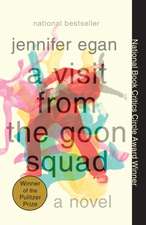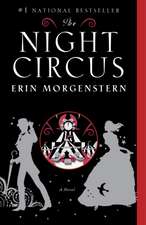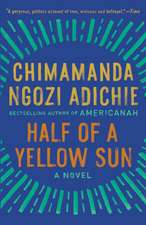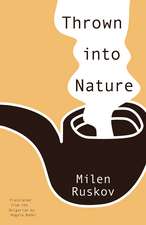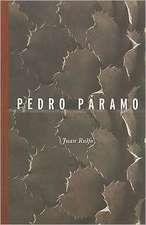A Nearly Perfect Copy
Autor Allison Amenden Limba Engleză Paperback – 27 ian 2014
Elm Howells has a loving family and a distinguished career at an elite Manhattan auction house. But after a tragic loss throws her into an emotional crisis, she pursues a reckless course of action that jeopardizes her personal and professional success. Meanwhile, talented artist Gabriel Connois wearies of remaining at the margins of the capricious Parisian art scene, and, desperate for recognition, he embarks on a scheme that threatens his burgeoning reputation. As these narratives converge, with disastrous consequences, A Nearly Perfect Copy boldly challenges our presumptions about originality and authenticity, loss and replacement, and the perilous pursuit of perfection.
Preț: 122.04 lei
Nou
Puncte Express: 183
Preț estimativ în valută:
23.35€ • 24.38$ • 19.28£
23.35€ • 24.38$ • 19.28£
Carte disponibilă
Livrare economică 25 martie-08 aprilie
Preluare comenzi: 021 569.72.76
Specificații
ISBN-13: 9780345803146
ISBN-10: 0345803140
Pagini: 284
Dimensiuni: 132 x 205 x 18 mm
Greutate: 0.24 kg
Editura: Anchor Books
ISBN-10: 0345803140
Pagini: 284
Dimensiuni: 132 x 205 x 18 mm
Greutate: 0.24 kg
Editura: Anchor Books
Notă biografică
Allison Amend, a graduate of the Iowa Writers’ Workshop, is the author of the Independent Publisher’s Award-winning short story collection Things That Pass for Love and the novel Stations West, which was a finalist for the 2011 Sami Rohr Prize for Jewish Literature and the Oklahoma Book Award. She lives in New York City, where she teaches creative writing at Lehman College.
Recenzii
"Allison Amend has given us a flawlessly rendered, totally engrossing, class-and-continent hopping story about the day to day struggles of marriage and loss, the commerce and caprice of high art, the reality of being talented and ambitious when talent and ambition are not enough, and the ethics of cloning. Every scene, every page, every passage of this novel has been written with the stunning clarity and great humanity of a true artist at the height of her abilities. My guess is, if you read this book you will soon be shoving it into the hand of someone you love. I certainly will." —Charles Bock, New York Times bestselling author of Beautiful Children
"Just when you think you know where A Nearly Perfect Copy is going, it swerves, like life, in some new direction. Allison Amend has packed this book with wit, style, yearning, risk, damage, truth, and compassion, populated it with characters who breathe with their own individual mystery, and along the way written what just might be the definitive fictional treatment of art forgery." —Kevin Brockmeier, author of The Brief History of the Dead
"Gracefully wielding a collage of unlikely elements, A Nearly Perfect Copy pits authenticity against imitation, deception against personal fulfillment, and replacement against irretrievable loss ... Intricate and ambitious ... Amend’s characters [are] relatable and visceral ... [Her] crisp, even prose is hard to pull away from and subtle in its elegance." —The Dallas Morning News
"Amend draws sharp characters [and] creates a nicely evolving plot ... What unfolds is acutely appealing: various characters struggling to overcome defeat and failure in their private and public lives against a backdrop filled with the particulars of middle-class family life and the art world here and abroad. I got caught up in their problems, their struggles. I loved the lore about the art business. Really, I found this to be a terrifically entertaining novel that never lost its hold on the hearts of its characters or mine." —Alan Cheuse, NPR
"A smart page turner ... Amend creates very real characters who live in a very unreal world. This is a wonderfully witty and stylish novel, perfect for the summer." —Elizabeth Taylor, Chicago Tribune
"Amend tells an absorbing story of believable characters walking a tightrope of ethical dilemma and despair ... Artistic and beautiful." —St. Louis Post-Dispatch
"A well-crafted and introspective novel that will provide fodder for thoughtful discussions on morality and integrity." —Fredericksburg Free Lance-Star
"[A] fast-paced, intriguing novel." —People
"Amend's brisk, complex second novel focuses on artistic lineage and forgery, loss and replacement, and questions of origin and originality ... Stunningly well-researched, A Nearly Perfect Copy is studded with fascinating detail—about the avenues by which art comes to auction and the machinery of auction houses, the way pulpy nineteenth-century paper can be simulated now, the kind of sketches that command collectors' attention. These facts are more than just narrative filigree; they suggest authenticity and discipline in a novel about fakery. A Nearly Perfect Copy poses serious moral questions...but its real subject matter seems to be the fraudulence or uncertainty of the self ... As Elm and Gabriel become more involved (and implicated) in their copying procedures and assignments the more their selves wobble and shake and flicker. And this motion, of the self trying to right itself, and the way Amend captures it on the page, is beautiful." —Mid-American Review
"This is what people mean when they use the term 'intelligent page-turner.' Amend is a brilliant storyteller, whose pitch-perfect observations call to mind Jonathan Franzen and Jennifer Egan. The complicated, completely fascinating characters (built with such human sympathy), the intricacy and cleverness of the plot, and the razor sharp exploration of contemporary mores make for a truly masterful read. I loved, loved, loved it." —Joanna Smith Rakoff, author of A Fortunate Age
"Clever, wry ... Amend makes her characters immediately real, depicting their complicated desires and decisions in a highly enjoyable, nearly perfect novel." —Publishers Weekly, starred review
“Amend creates suspense by charting in wincing detail Elm’s and Gabriel’s progress through ethically gray areas in the art market to unquestionably illegal acts ... Well-wrought ... the author meticulously delineates [her characters’] yearnings and frustrations ... Cleverly rendered.” —The Washington Post
"[Written] with supple command, caustic wit, and a deep fascination with decent people who lose their moral compass ... As Amend tracks the descent of her two wounded and alienated innocents into lies, desperation, and crime, her visual acuity, fluent psychology, venture into the shadow side of the art world, and storytelling verve make for a blue-chip novel of substance and suspense."
—Booklist
"Something very real comes out of the many layers of forgery in Allison Amend's brainy intrigue of the shadowy side of the art world. Provenance is earned in more than the expected ways! A Nearly Perfect Copy is a captivating story." —Ron Carlson, author of The Signal
"Allison Amend is a gifted storyteller—no, more than gifted. Her writing is powerful enough to create its own kind of weather. Her characters are so real it's as if you could reach between the pages and shake hands with them." —Hannah Tinti, author of The Good Thief
"A fast-paced, lively novel of forgery ... Amend provides a fizzy, entertaining insider's look at the conjunction of visual art and commerce—especially the world of art auctions ... Her exploration of the ethics and the mechanics of the art world provide charm and enjoyment ... A provocative and likable read." —Kirkus Reviews
"Amend’s talent is on full display as these smart, complex narratives dance around each other, each capturing the reader’s imagination without ever detracting from the other story. Although she’s received critical acclaim for her work in a number of literary publications and for her historical novel, Stations West, this finely rendered portrait of two lives should introduce Amend to a wider audience." —BookPage
"[An] intricate, witty page-turner." —Stanford Magazine
"It’s not every day that you get to read a novel that deals with art, money, death, love, marriage, and a cloned dog, but still somehow manages to be moving, funny, and a page-turner all at the same time." —Amy Brill, author of The Movement of Stars
From the Hardcover edition.
"Just when you think you know where A Nearly Perfect Copy is going, it swerves, like life, in some new direction. Allison Amend has packed this book with wit, style, yearning, risk, damage, truth, and compassion, populated it with characters who breathe with their own individual mystery, and along the way written what just might be the definitive fictional treatment of art forgery." —Kevin Brockmeier, author of The Brief History of the Dead
"Gracefully wielding a collage of unlikely elements, A Nearly Perfect Copy pits authenticity against imitation, deception against personal fulfillment, and replacement against irretrievable loss ... Intricate and ambitious ... Amend’s characters [are] relatable and visceral ... [Her] crisp, even prose is hard to pull away from and subtle in its elegance." —The Dallas Morning News
"Amend draws sharp characters [and] creates a nicely evolving plot ... What unfolds is acutely appealing: various characters struggling to overcome defeat and failure in their private and public lives against a backdrop filled with the particulars of middle-class family life and the art world here and abroad. I got caught up in their problems, their struggles. I loved the lore about the art business. Really, I found this to be a terrifically entertaining novel that never lost its hold on the hearts of its characters or mine." —Alan Cheuse, NPR
"A smart page turner ... Amend creates very real characters who live in a very unreal world. This is a wonderfully witty and stylish novel, perfect for the summer." —Elizabeth Taylor, Chicago Tribune
"Amend tells an absorbing story of believable characters walking a tightrope of ethical dilemma and despair ... Artistic and beautiful." —St. Louis Post-Dispatch
"A well-crafted and introspective novel that will provide fodder for thoughtful discussions on morality and integrity." —Fredericksburg Free Lance-Star
"[A] fast-paced, intriguing novel." —People
"Amend's brisk, complex second novel focuses on artistic lineage and forgery, loss and replacement, and questions of origin and originality ... Stunningly well-researched, A Nearly Perfect Copy is studded with fascinating detail—about the avenues by which art comes to auction and the machinery of auction houses, the way pulpy nineteenth-century paper can be simulated now, the kind of sketches that command collectors' attention. These facts are more than just narrative filigree; they suggest authenticity and discipline in a novel about fakery. A Nearly Perfect Copy poses serious moral questions...but its real subject matter seems to be the fraudulence or uncertainty of the self ... As Elm and Gabriel become more involved (and implicated) in their copying procedures and assignments the more their selves wobble and shake and flicker. And this motion, of the self trying to right itself, and the way Amend captures it on the page, is beautiful." —Mid-American Review
"This is what people mean when they use the term 'intelligent page-turner.' Amend is a brilliant storyteller, whose pitch-perfect observations call to mind Jonathan Franzen and Jennifer Egan. The complicated, completely fascinating characters (built with such human sympathy), the intricacy and cleverness of the plot, and the razor sharp exploration of contemporary mores make for a truly masterful read. I loved, loved, loved it." —Joanna Smith Rakoff, author of A Fortunate Age
"Clever, wry ... Amend makes her characters immediately real, depicting their complicated desires and decisions in a highly enjoyable, nearly perfect novel." —Publishers Weekly, starred review
“Amend creates suspense by charting in wincing detail Elm’s and Gabriel’s progress through ethically gray areas in the art market to unquestionably illegal acts ... Well-wrought ... the author meticulously delineates [her characters’] yearnings and frustrations ... Cleverly rendered.” —The Washington Post
"[Written] with supple command, caustic wit, and a deep fascination with decent people who lose their moral compass ... As Amend tracks the descent of her two wounded and alienated innocents into lies, desperation, and crime, her visual acuity, fluent psychology, venture into the shadow side of the art world, and storytelling verve make for a blue-chip novel of substance and suspense."
—Booklist
"Something very real comes out of the many layers of forgery in Allison Amend's brainy intrigue of the shadowy side of the art world. Provenance is earned in more than the expected ways! A Nearly Perfect Copy is a captivating story." —Ron Carlson, author of The Signal
"Allison Amend is a gifted storyteller—no, more than gifted. Her writing is powerful enough to create its own kind of weather. Her characters are so real it's as if you could reach between the pages and shake hands with them." —Hannah Tinti, author of The Good Thief
"A fast-paced, lively novel of forgery ... Amend provides a fizzy, entertaining insider's look at the conjunction of visual art and commerce—especially the world of art auctions ... Her exploration of the ethics and the mechanics of the art world provide charm and enjoyment ... A provocative and likable read." —Kirkus Reviews
"Amend’s talent is on full display as these smart, complex narratives dance around each other, each capturing the reader’s imagination without ever detracting from the other story. Although she’s received critical acclaim for her work in a number of literary publications and for her historical novel, Stations West, this finely rendered portrait of two lives should introduce Amend to a wider audience." —BookPage
"[An] intricate, witty page-turner." —Stanford Magazine
"It’s not every day that you get to read a novel that deals with art, money, death, love, marriage, and a cloned dog, but still somehow manages to be moving, funny, and a page-turner all at the same time." —Amy Brill, author of The Movement of Stars
From the Hardcover edition.
Extras
Sometimes when she closed her eyes, Elm could see the wall of water moving toward her. The hissing of the wave’s retraction burned her eardrums, and she shivered as though pinned down again in the wet debris. These were the sensations she returned to, as if by default, the images repeating over and over again.
At three in the afternoon on a May Tuesday, Elm sat in a meeting with the other department heads of Tinsley’s. It was getting dark; the sun had slipped behind the building across the street and the sounds of traffic below were faint through the double-paned windows.
“Elm? Elm?” Ian tapped her shoulder.
“What? Sorry.” Elm sat up straighter and rifled the papers on the conference table before her.
“Quarterlies,” Ian reminded her softly.
“Right, well, as you know, the first fiscal quarter,” Elm began, buying time while she looked for her notes, which she’d put in the folder in front of her, she was sure of it. This is what comes from sticking an art history major in a corporate job, she thought; it’s like getting a horse to dance: it might happen, but it won’t be pretty.
And then her notes revealed themselves, on top, ready for her presentation. She cleared her throat. “The first fiscal quarter,” she repeated, “saw a drop in revenue from last year’s recorded earnings from the same period.” Colette, an associate specialist from the Paris branch of the auction house, was tapping her fountain pen against her paper, her pug nose wiggling in time.
“How is this possible in the biggest art boom of the century?” Greer asked.
Elm sat for a moment until she realized the question wasn’t rhetorical. “Well, it’s possible we’re seeing the downside of that boom. The energy crisis—”
“Yes, but we’re selling art, not pork bellies,” Greer said. “At least, that’s the theory.”
Greer Tinsley never let pass a chance to upbraid Elm in public, capitalizing on his position as CEO of the auction house, and Elm’s sub- ordinate post as head of seventeenth- through nineteenth-century drawings and prints. They were both the heirs to the auction house that bore their great-grandfather’s name, but the shareholders were in charge now. Though Elm was, in Greer’s mind, one of the inferior cousins, she was a Tinsley, no doubt about it, the chestnut hair that would accept no dye, the birdlike nose that no rhinoplaster had ever successfully eradicated.
Elm let her hands fall to her sides. She had found that when being confronted by Greer, the best course of action was to take none.
“I mean, that is the theory, isn’t it?” Greer’s accent was affected, what some might call “Continental” and what Elm’s husband called “international queen.” He was the only man she knew who still wore an ascot, though there were plenty of employees of Tinsley’s who wore pocket squares to match their ties.
“Yes, it is the theory,” Elm said.
“I mean, we’re not a museum, are we? Collecting for our own personal edification?”
He seemed to expect an answer so Elm said, “No, no edification.”
Greer sighed heavily. “So what plans do we have for improving this trend?”
Ian stood up, coming to Elm’s rescue. “Well, Greer, we are ramping up our business-getting, which should permit us to move more volume. There are a couple of commissions that Elm has garnered . . .”
“Good.” Greer seemed uninterested when the objective was not Elm’s humiliation. “Numbers like this make my—our”—he gestured at Elm without looking at her—“great-grandfather turn over in his grave. Any other business? No?”
Elm breathed a sigh of relief and began to gather her papers. On his way out, Greer approached her. “Elm, I’d like to talk to you. Can you come to my office in a few?”
“Sure,” Elm answered, her heart contracting like she was a child in trouble for passing notes at school. She pretended to need to order her papers while she waited until everyone else exited the conference room. Ian was standing just outside.
He always managed to push the dress code envelope. Today he wore a pink and blue V-striped shirt under a definitely purple suit, though Elm thought it might be able to pass for an iridescent black that had been dry-cleaned too many times.
“Thanks, I owe you,” she said.
“I’ll put it on your tab,” he said, and Elm wasn’t sure if he was joking or annoyed. “Did you call that woman back?”
“Not yet,” Elm said. “Did we determine, is she an Attic?” Attic was their term for an old person, almost invariably a woman, who would insist that her grandfather had been Monet’s gardener and saved a masterpiece. It was up in the attic somewhere, if they could just send some nice young person to muck around in the cobwebs for a couple of days, effectively cleaning out the woman’s attic for her.
“Probably. Upper West Side.”
Elm shrugged. Though the really big sales were from major estates and collectors, it was not inconceivable that some rich widow on Central Park West owned a few minor Guardis or Valtats. Enough of those allowed for a comfortable base on which to search for larger commissions.
“You want me to do it for you?” Ian put his hands on his hips. His jacket neglected to bulge, like it was stapled to his shirt.
“Thank you, yet again,” Elm said. “You know you’re good with the ladies.”
“Right. Old ladies and pedigree dogs. Attractive, successful men my own age with a trust fund, not so much.”
“Where would I be without you?” Elm asked. “What’s more nowhere than nowhere?”
“The East Nineties?”
“Ha.” Elm lived on East Ninety-fifth Street.
Ian’s cell phone sounded. His ringtone was a trumpet calling for the start of a horse race. “Hello? Oh, hiiii,” he drawled, turning down the hall and waving good-bye.
Greer’s office had a magnificent view of the East River. Even on the grayest day it was suffused with light. Elm had learned to make afternoon appointments, as Greer sat with his back to the view, and the strong morning sun blinded those who sat across from him. His office was decorated in the traditional masculinity of dark wood—wainscoting, panels, built-ins—all of it shiny tobacco-brown oak. His grand desk was a nineteenth-century Chippendale masterpiece, Baroque and ornately carved. On its legs were faces, flowers, vines, and, of course, eagle feet gripping balls blunted on the floor. The top was so polished Elm could see her reflection when she leaned over it, and it was devoid of everything except a telephone and a computer—no pens, blotter, photos, in-box/out-box, nothing.
“Elmira,” he said, feigning surprise at her appearance. “There you are. Will you sit?”
“How’s Anne?”
“Connecticut,” he replied, answering a different question. “Putting up the rosebushes or something. Colin?” he asked. “Moira?”
“Great, both great.” Elm smiled. She knew he didn’t really want news; he was merely being polite. There was a short silence. Behind him, framed by the bay windows, a tugboat trudged down the East River, stacks of used tires on its bow.
“Elmira,” he said. “I’m concerned.”
“I know,” Elm said. “You mentioned in the meeting.”
“No, but I’m very concerned.” Greer sat back, placing his ankle on his knee. He was reminding her with his body language that he was the real Tinsley, she the interloper. There had been a scandal involving Elm’s grandmother’s marriage and since then her side of the family got the smallest cottage on the family compound and saw little of the estate’s large dividends. Elm’s father had made some money in real estate, of all things, which was only slightly better than cleaning toilets in the family’s estimation. But then the social order went by the wayside and the company went public and Greer’s insistence on family hierarchy was sheer snobbery.
“Elm, please understand you are a valued and respected part of this establishment—”
“And a Tinsley,” Elm interrupted.
Greer nodded, pained. “But I don’t think Great-grandfather would have wanted it to be run into the ground for the sake of family loyalty.”
“I don’t think Great-grandfather, as you call him, would have considered me a Tinsley.”
“Maybe not,” he said. Elm had found out from Greer’s brother, the sweet and affable, if prodigal, Will, who was now squandering his fortune on snow bunnies in Aspen, that Greer had objected to Elm’s hiring, and was overruled by then-chairman-of-the-board Greer Senior. Elm wasn’t sure now if Greer harbored the same set of prejudices that influenced his opposition to her ten years ago, or if he was nursing new ones. Similarly, she wasn’t sure what the grounds for objection were. The degree from the lesser undergraduate institution (lesser meaning, of course, not Yale or Harvard)? But surely he couldn’t argue with the graduate degree from Columbia. Or the fact that she was considered an expert in her field, the go-to person for a New York Times quote, the one who took big clients to dinner, a member of the board of trustees of two museums and the art consultant to a trendy, invited-members-only downtown social club. Maybe it was just the fact that she wasn’t close family—her blood diluted. It wasn’t worth thinking about. It was impossible to think rationally about irrational thoughts.
“Maybe, Elm, you want to take some time off.” Greer’s voice rose at the end of the sentence. He was trying to sound nonchalant, off the cuff.
“To heal?” she asked. She was attempting sarcasm, but she suspected he hadn’t heard.
“If you like.” Greer looked at his desk, desperate, Elm thought, for something to distract him. Finding nothing, he examined his fingernails. “You’ve barely taken any time since . . .” He let the sentence trail off.
“And prints and drawings?”
“We’ll get someone else to pitch in for a while.”
Elm stood. “If you want me to leave, then fire me. But stop this passive-aggressive looking-out-for-my-best-interests crap.”
“Keep your voice down,” Greer said sternly. “Get ahold of yourself.”
“Right,” Elm said. “The family creed. Do not show emotion. Do not embarrass the family. Grieve your dead son in silence.”
Now Greer was standing too, shocked by the mention of Ronan, her son. “What do you want from me?” he hiss-whispered; he didn’t want his secretary to overhear them.
“Nothing,” Elm said. Suddenly, the anger was gone, as though she’d been seized by a cramp and released. These bursts came and went, leaving her apologetic and defensive. “Sorry. I’ll focus. We’ll be back in the saddle by the fall season.”
“I hope so,” Greer said. “I certainly hope so.”
At home, Elm’s doorman informed her that Moira and Wania had beaten her home. As soon as she opened the door, Moira yelled, “Mommymommy Mommymommymommy,” and threw herself into Elm’s legs.
“Hi, bunny,” she said, shuffling forward.
Wania sat on the couch in front of the television rebraiding a long strand of hair. “Afternoon, Ms. Howells.” She was from Jamaica, and Elm understood approximately 30 percent of what she said. Once she told Elm that the “peenters” had come, and Elm asked, “What?” three times until she pretended to understand. It wasn’t until that evening, lying in bed, replaying the day, that she realized Wania had meant “painters.”
“How was school?”
“Fine,” they both answered automatically.
“Andrew was really funny today, mon.” Moira had picked up Wania’s Jamaican slang. It drove Colin crazy, but Elm found it amusing. “He made this noise in art class like this”—Moira blew a raspberry into her forearm—“and everybody really laughed. Even Mrs. Buchner.” Elm was half listening, flipping through the mail. Bill, bill, package of coupons, labels from the Children’s Aid Society, cable television offer, cable television offer, cable television offer. “And, Mom? It sounded like he farted,” Moira explained, in case Elm didn’t get the joke.
“Funny,” Elm said, placing her hand on Moira’s snarled hair, a continual struggle. She had practically come out of the womb with a mess of tangles, and no amount of conditioner would keep them from forming. Elm had given up on attempts to brush or braid it, and let Moira attend her tony private kindergarten wild-headed.
Seeing that her mother wasn’t interested, Moira danced around in circles for a moment, and then settled in front of the television.
“You know, Wania,” Elm said. “You can go, if you want.”
“Are you sure, Ms. H?” Wania perked up.
“Yeah. I’m not going to the gym or anything today. Is there dinner?” Elm lived the ultimate New York stereotype. She couldn’t cook, Colin couldn’t cook, and their housekeeper/nanny couldn’t cook. Instead, Wania bought prepared food at Citarella or Zabar’s or Fairway every day.
“Chicken fingers,” Wania said, pointing to Moira, “and spinach- stuffed chicken breast.”
“Perfect,” Elm said. “Thank you.”
At three in the afternoon on a May Tuesday, Elm sat in a meeting with the other department heads of Tinsley’s. It was getting dark; the sun had slipped behind the building across the street and the sounds of traffic below were faint through the double-paned windows.
“Elm? Elm?” Ian tapped her shoulder.
“What? Sorry.” Elm sat up straighter and rifled the papers on the conference table before her.
“Quarterlies,” Ian reminded her softly.
“Right, well, as you know, the first fiscal quarter,” Elm began, buying time while she looked for her notes, which she’d put in the folder in front of her, she was sure of it. This is what comes from sticking an art history major in a corporate job, she thought; it’s like getting a horse to dance: it might happen, but it won’t be pretty.
And then her notes revealed themselves, on top, ready for her presentation. She cleared her throat. “The first fiscal quarter,” she repeated, “saw a drop in revenue from last year’s recorded earnings from the same period.” Colette, an associate specialist from the Paris branch of the auction house, was tapping her fountain pen against her paper, her pug nose wiggling in time.
“How is this possible in the biggest art boom of the century?” Greer asked.
Elm sat for a moment until she realized the question wasn’t rhetorical. “Well, it’s possible we’re seeing the downside of that boom. The energy crisis—”
“Yes, but we’re selling art, not pork bellies,” Greer said. “At least, that’s the theory.”
Greer Tinsley never let pass a chance to upbraid Elm in public, capitalizing on his position as CEO of the auction house, and Elm’s sub- ordinate post as head of seventeenth- through nineteenth-century drawings and prints. They were both the heirs to the auction house that bore their great-grandfather’s name, but the shareholders were in charge now. Though Elm was, in Greer’s mind, one of the inferior cousins, she was a Tinsley, no doubt about it, the chestnut hair that would accept no dye, the birdlike nose that no rhinoplaster had ever successfully eradicated.
Elm let her hands fall to her sides. She had found that when being confronted by Greer, the best course of action was to take none.
“I mean, that is the theory, isn’t it?” Greer’s accent was affected, what some might call “Continental” and what Elm’s husband called “international queen.” He was the only man she knew who still wore an ascot, though there were plenty of employees of Tinsley’s who wore pocket squares to match their ties.
“Yes, it is the theory,” Elm said.
“I mean, we’re not a museum, are we? Collecting for our own personal edification?”
He seemed to expect an answer so Elm said, “No, no edification.”
Greer sighed heavily. “So what plans do we have for improving this trend?”
Ian stood up, coming to Elm’s rescue. “Well, Greer, we are ramping up our business-getting, which should permit us to move more volume. There are a couple of commissions that Elm has garnered . . .”
“Good.” Greer seemed uninterested when the objective was not Elm’s humiliation. “Numbers like this make my—our”—he gestured at Elm without looking at her—“great-grandfather turn over in his grave. Any other business? No?”
Elm breathed a sigh of relief and began to gather her papers. On his way out, Greer approached her. “Elm, I’d like to talk to you. Can you come to my office in a few?”
“Sure,” Elm answered, her heart contracting like she was a child in trouble for passing notes at school. She pretended to need to order her papers while she waited until everyone else exited the conference room. Ian was standing just outside.
He always managed to push the dress code envelope. Today he wore a pink and blue V-striped shirt under a definitely purple suit, though Elm thought it might be able to pass for an iridescent black that had been dry-cleaned too many times.
“Thanks, I owe you,” she said.
“I’ll put it on your tab,” he said, and Elm wasn’t sure if he was joking or annoyed. “Did you call that woman back?”
“Not yet,” Elm said. “Did we determine, is she an Attic?” Attic was their term for an old person, almost invariably a woman, who would insist that her grandfather had been Monet’s gardener and saved a masterpiece. It was up in the attic somewhere, if they could just send some nice young person to muck around in the cobwebs for a couple of days, effectively cleaning out the woman’s attic for her.
“Probably. Upper West Side.”
Elm shrugged. Though the really big sales were from major estates and collectors, it was not inconceivable that some rich widow on Central Park West owned a few minor Guardis or Valtats. Enough of those allowed for a comfortable base on which to search for larger commissions.
“You want me to do it for you?” Ian put his hands on his hips. His jacket neglected to bulge, like it was stapled to his shirt.
“Thank you, yet again,” Elm said. “You know you’re good with the ladies.”
“Right. Old ladies and pedigree dogs. Attractive, successful men my own age with a trust fund, not so much.”
“Where would I be without you?” Elm asked. “What’s more nowhere than nowhere?”
“The East Nineties?”
“Ha.” Elm lived on East Ninety-fifth Street.
Ian’s cell phone sounded. His ringtone was a trumpet calling for the start of a horse race. “Hello? Oh, hiiii,” he drawled, turning down the hall and waving good-bye.
Greer’s office had a magnificent view of the East River. Even on the grayest day it was suffused with light. Elm had learned to make afternoon appointments, as Greer sat with his back to the view, and the strong morning sun blinded those who sat across from him. His office was decorated in the traditional masculinity of dark wood—wainscoting, panels, built-ins—all of it shiny tobacco-brown oak. His grand desk was a nineteenth-century Chippendale masterpiece, Baroque and ornately carved. On its legs were faces, flowers, vines, and, of course, eagle feet gripping balls blunted on the floor. The top was so polished Elm could see her reflection when she leaned over it, and it was devoid of everything except a telephone and a computer—no pens, blotter, photos, in-box/out-box, nothing.
“Elmira,” he said, feigning surprise at her appearance. “There you are. Will you sit?”
“How’s Anne?”
“Connecticut,” he replied, answering a different question. “Putting up the rosebushes or something. Colin?” he asked. “Moira?”
“Great, both great.” Elm smiled. She knew he didn’t really want news; he was merely being polite. There was a short silence. Behind him, framed by the bay windows, a tugboat trudged down the East River, stacks of used tires on its bow.
“Elmira,” he said. “I’m concerned.”
“I know,” Elm said. “You mentioned in the meeting.”
“No, but I’m very concerned.” Greer sat back, placing his ankle on his knee. He was reminding her with his body language that he was the real Tinsley, she the interloper. There had been a scandal involving Elm’s grandmother’s marriage and since then her side of the family got the smallest cottage on the family compound and saw little of the estate’s large dividends. Elm’s father had made some money in real estate, of all things, which was only slightly better than cleaning toilets in the family’s estimation. But then the social order went by the wayside and the company went public and Greer’s insistence on family hierarchy was sheer snobbery.
“Elm, please understand you are a valued and respected part of this establishment—”
“And a Tinsley,” Elm interrupted.
Greer nodded, pained. “But I don’t think Great-grandfather would have wanted it to be run into the ground for the sake of family loyalty.”
“I don’t think Great-grandfather, as you call him, would have considered me a Tinsley.”
“Maybe not,” he said. Elm had found out from Greer’s brother, the sweet and affable, if prodigal, Will, who was now squandering his fortune on snow bunnies in Aspen, that Greer had objected to Elm’s hiring, and was overruled by then-chairman-of-the-board Greer Senior. Elm wasn’t sure now if Greer harbored the same set of prejudices that influenced his opposition to her ten years ago, or if he was nursing new ones. Similarly, she wasn’t sure what the grounds for objection were. The degree from the lesser undergraduate institution (lesser meaning, of course, not Yale or Harvard)? But surely he couldn’t argue with the graduate degree from Columbia. Or the fact that she was considered an expert in her field, the go-to person for a New York Times quote, the one who took big clients to dinner, a member of the board of trustees of two museums and the art consultant to a trendy, invited-members-only downtown social club. Maybe it was just the fact that she wasn’t close family—her blood diluted. It wasn’t worth thinking about. It was impossible to think rationally about irrational thoughts.
“Maybe, Elm, you want to take some time off.” Greer’s voice rose at the end of the sentence. He was trying to sound nonchalant, off the cuff.
“To heal?” she asked. She was attempting sarcasm, but she suspected he hadn’t heard.
“If you like.” Greer looked at his desk, desperate, Elm thought, for something to distract him. Finding nothing, he examined his fingernails. “You’ve barely taken any time since . . .” He let the sentence trail off.
“And prints and drawings?”
“We’ll get someone else to pitch in for a while.”
Elm stood. “If you want me to leave, then fire me. But stop this passive-aggressive looking-out-for-my-best-interests crap.”
“Keep your voice down,” Greer said sternly. “Get ahold of yourself.”
“Right,” Elm said. “The family creed. Do not show emotion. Do not embarrass the family. Grieve your dead son in silence.”
Now Greer was standing too, shocked by the mention of Ronan, her son. “What do you want from me?” he hiss-whispered; he didn’t want his secretary to overhear them.
“Nothing,” Elm said. Suddenly, the anger was gone, as though she’d been seized by a cramp and released. These bursts came and went, leaving her apologetic and defensive. “Sorry. I’ll focus. We’ll be back in the saddle by the fall season.”
“I hope so,” Greer said. “I certainly hope so.”
At home, Elm’s doorman informed her that Moira and Wania had beaten her home. As soon as she opened the door, Moira yelled, “Mommymommy Mommymommymommy,” and threw herself into Elm’s legs.
“Hi, bunny,” she said, shuffling forward.
Wania sat on the couch in front of the television rebraiding a long strand of hair. “Afternoon, Ms. Howells.” She was from Jamaica, and Elm understood approximately 30 percent of what she said. Once she told Elm that the “peenters” had come, and Elm asked, “What?” three times until she pretended to understand. It wasn’t until that evening, lying in bed, replaying the day, that she realized Wania had meant “painters.”
“How was school?”
“Fine,” they both answered automatically.
“Andrew was really funny today, mon.” Moira had picked up Wania’s Jamaican slang. It drove Colin crazy, but Elm found it amusing. “He made this noise in art class like this”—Moira blew a raspberry into her forearm—“and everybody really laughed. Even Mrs. Buchner.” Elm was half listening, flipping through the mail. Bill, bill, package of coupons, labels from the Children’s Aid Society, cable television offer, cable television offer, cable television offer. “And, Mom? It sounded like he farted,” Moira explained, in case Elm didn’t get the joke.
“Funny,” Elm said, placing her hand on Moira’s snarled hair, a continual struggle. She had practically come out of the womb with a mess of tangles, and no amount of conditioner would keep them from forming. Elm had given up on attempts to brush or braid it, and let Moira attend her tony private kindergarten wild-headed.
Seeing that her mother wasn’t interested, Moira danced around in circles for a moment, and then settled in front of the television.
“You know, Wania,” Elm said. “You can go, if you want.”
“Are you sure, Ms. H?” Wania perked up.
“Yeah. I’m not going to the gym or anything today. Is there dinner?” Elm lived the ultimate New York stereotype. She couldn’t cook, Colin couldn’t cook, and their housekeeper/nanny couldn’t cook. Instead, Wania bought prepared food at Citarella or Zabar’s or Fairway every day.
“Chicken fingers,” Wania said, pointing to Moira, “and spinach- stuffed chicken breast.”
“Perfect,” Elm said. “Thank you.”



